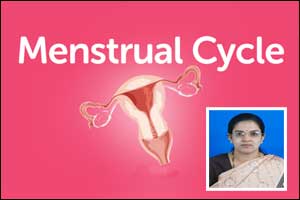- Home
- Editorial
- News
- Practice Guidelines
- Anesthesiology Guidelines
- Cancer Guidelines
- Cardiac Sciences Guidelines
- Critical Care Guidelines
- Dentistry Guidelines
- Dermatology Guidelines
- Diabetes and Endo Guidelines
- Diagnostics Guidelines
- ENT Guidelines
- Featured Practice Guidelines
- Gastroenterology Guidelines
- Geriatrics Guidelines
- Medicine Guidelines
- Nephrology Guidelines
- Neurosciences Guidelines
- Obs and Gynae Guidelines
- Ophthalmology Guidelines
- Orthopaedics Guidelines
- Paediatrics Guidelines
- Psychiatry Guidelines
- Pulmonology Guidelines
- Radiology Guidelines
- Surgery Guidelines
- Urology Guidelines
Influence of Menstrual Cycle on perioperative management- Dr Madhuri Kurdi

Menstruation and the menstrual cycle are a part of the normal physiology of women. They involve an invisible interaction between various fluctuating hormones, especially, oestrogen and progesterone. The phase-wise physiological changes can be significant enough to alter the perioperative management of a female patient. Research studies have revealed higher levels of sympathetic activity, heart rates and blood pressures in women in the luteal phase.
Variations in the QTc interval including prolongation in the follicular phase can make the woman prone to cardiac arrhythmias. During the luteal phase, the haemodynamic response to physiological and psychological stress and tracheal intubation has been found to be increased. Several studies have shown lesser pain perception in the follicular phase.
The vocal cord folds are swollen due to water retention in the follicular phase and are dry and thick during ovulation. Decreased sedative and hypnotic drug requirements in the luteal phase owing to reasons like the sedative effect of progesterone is a significant finding of several researchers.
The minimum alveolar concentration of volatile anaesthetics like sevoflurane and the requirement of the induction drug propofol was found to be less in the follicular phase as compared to the luteal phase in some studies. In the perimenstrual patient, the perioperative period may be marked by a flare-up of systemic diseases like bronchial asthma, migraine, epilepsy, mental disorders, glaucoma, and allergies and also with conditions like catamenial pneumothorax, haemothorax, peripheral and vocal cord oedema and an increased incidence of postoperative nausea and vomiting.
The ovulating female is susceptible to postoperative nausea, vomiting and a flare up of bronchial asthma. The effect of the changes in other body systems on perioperative physiology and outcomes is not very clear. We need to probe further into how the changes in the menstrual cycle can affect perioperative anaesthetic management and outcomes.
For more details click on the link: DOI: 10.4103/ija.IJA_139_18
Dr. Madhuri Kurdi
The author is MD (Anaesthesiology )and is Professor Karnataka Institute of Medical Sciences, Hubli, Karnataka. She is a member Editorial Board, Anesthesiology at Specialty Medical Dialogues.

Disclaimer: This site is primarily intended for healthcare professionals. Any content/information on this website does not replace the advice of medical and/or health professionals and should not be construed as medical/diagnostic advice/endorsement or prescription. Use of this site is subject to our terms of use, privacy policy, advertisement policy. © 2020 Minerva Medical Treatment Pvt Ltd